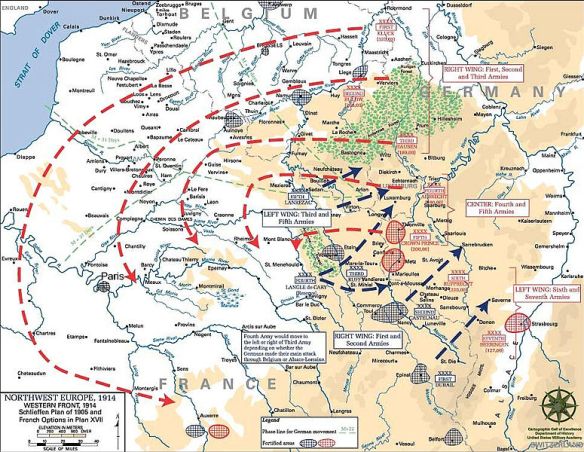For l'appropriate Veteran"s Day Salute - check this out
For l' inappropriate Veteran"s Day Delights - here ya go!
Right now, somewhere, students are debating the culpability of Germany for WWI and the dis/proportionality of the Treaty of Versailles. No surprises there. It’s a fundamental question in world history and the dominos of the July Crisis used to be among the most prestigious questions for historians to tackle. Why did the Fashoda Incident and Anglo-German East Africa Crisis remain staid diplomatic affairs and the assassination of an Archduke on the periphery of empire spark a war?
The answer, or at least a large part of it, is the Schlieffen Plan, and its reordering of national priorities.
Following unification, German military thinkers saw the imperative of planning for a two front war against France and Russia. The solution–not to put too fine a point on it–was to pit Teutonic efficiency against Gallic weakness and Slavic disorganization. Using incredibly precise time tables, the German army would overrun France through Belgium in a great flank around Paris. The French defeated, and with Russia still slowly mobilizing its forces, the German army could then shift its full attention to the Eastern Front.
The key here is that for the O-plan to work France had to capitulate before Russia fully mobilized.
Thus during the July crisis when Russia began to mobilize BEFORE France it put the German High Command in a bind. A pretext for war with France was invented, Belgium invaded, British intervention assured and the rest is why most of us have Monday off of work. Last minute efforts by the Kaiser to put the breaks on a general European war proved feckless. The Germans had a plan, and that plan had to be executed.
Ultimately German fixation with the O-plan led to an inversion of the political and strategic levels of war. Strategy began to dictate politics. The German High Command’s O-plan had so much influence that Berchtold once exclaimed: “Who actually rules in Berlin, Bethmann or Moltke.” The results were entropic, or as Bethmann Hollweg helplessly remarked “things are out of control and the stone has started to roll.” In 1914 the Schlieffen plan ossified diplomatic efforts and political maneuverability for a dubious military advantage.
In an age of red lines and war games that’s worth keeping in mind.
Pic - "Home before the leaves fall!"


